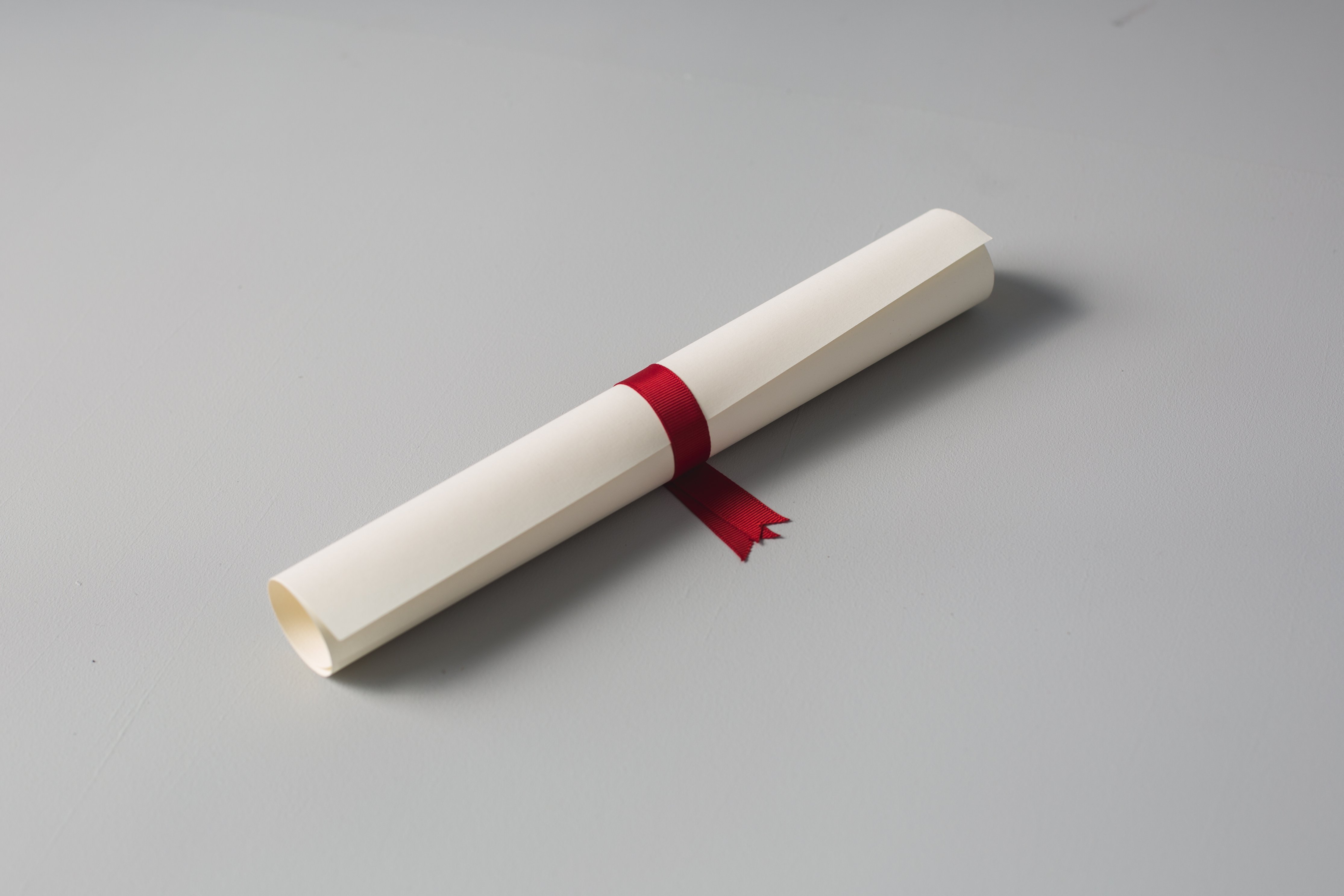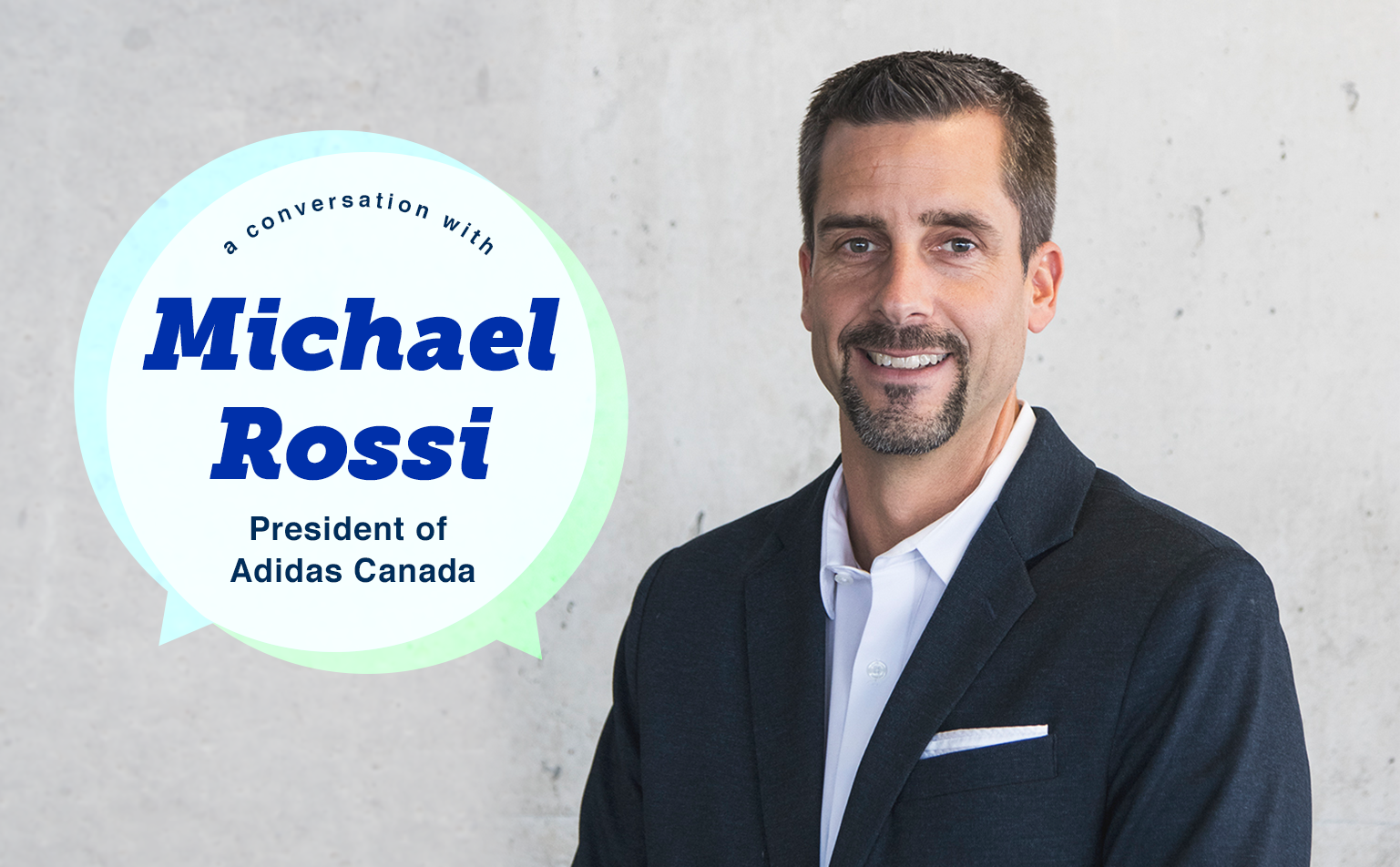Student Life Network recently sat down with another successful business executive as part of SLN’s Executive Leadership Interview Series. Read on to learn what Michael Rossi had to say to us about achieving success.
Would you believe me if I told you that Michael Rossi, President of Adidas Canada, graduated at the top of his class from the prestigious Ivey School of Business, without a job? It’s a true story, and one that Rossi himself couldn’t believe at the time. However, it’s merely one small chapter in a book which spans decades.
Your career is something you’re going to work on for approximately 40 years. And along the way, you’re going to encounter all sorts of ups-and-downs. Sometimes you’ll get it right, and other times you won’t. But that’s the beauty of it all: you’re the author, and you get to write your story. Rossi wrote a story about structure and balance; structure in developing habits and vision, and balance when it comes to navigating obstacles and setbacks. All the while, he leaned on a saying from his late father: “enjoy the journey”.
High school is a journey, post-secondary is a journey, and your career is a journey. It’s not your failed exam, your low GPA, or the job you didn’t get. Those are simply moments in a long, winding, captivating novel:
“The Long Game,” by you.
Part 1: High School

How would you describe Michael Rossi in high school?
Relative to how I am now, I was more reserved. I was disciplined and always did well in school. I wasn’t much of a slacker.
Towards the end of high school, I was working as a bat boy with the Toronto Blue Jays. That meant as soon as school finished, I’d be heading down either with my parents or on the TTC to attend a night game. I’d be at the SkyDome until midnight, and then I’d be up early the next morning and back to high school. I’d balance those two priorities and never let my grades slip. Even in the summers during high school, I was working a day job in a bank as a teller because I wanted to get more business experience to go along with a cool sports job.
You wanted to keep your options open, right?
Exactly. I was structured but still balanced. I think that’s been a theme throughout my life. As much as academics were important, so were sports, friendships, and all of the other things integral to being a well-rounded, balanced person.
In your final year of high school, how were you feeling about your future?
Optimistic. Even as a younger kid, I always felt like you could do whatever you wanted—that you could be whoever you wanted, and that everyone in the world had a voice. So, for me, starting to think about going to university was exciting because it was challenging. The opportunity would allow me to push myself. I was energized to get out to Western University to experience all that.
Western University, where you enrolled in the prestigious Ivey HBA program. Why that program?
I always had an interest in business. Where some people probably wrestle with either not knowing what they’re interested in and not knowing where their path might take them (or being torn between multiple paths), I was always pretty clear about what I wanted. When I was applying to universities, I had three applications out—one was York University, to their business program. The other two were to Western University (one to their main campus and one to one of their colleges).
Part 2: Post-Secondary

You described yourself optimistic in your final year of high school. Did that feeling carry over during your transition to your first year at Ivey?
One of the things that made it a little easier for me was that I had probably about four or five friends from my high school that also went to Western University.
That certainly helps.
Yes. Moreover, what was interesting is that we all lived in different residences. It gave me a bit of a support network, but at the same time, we were all doing our own things.
I embraced the full experience and dove into student life. Getting to a fantastic school with so much energy and so much freedom to learn and to experience things, I dove in with both feet. When I look at the things I accomplished there—the stuff I got involved with, the people I met—I think that openness and desire to not squander the opportunity and experience it to the fullest led me to a lot of the success and a lot of the experiences I’ve had.
You mentioned you were academically inclined in high school. Did that also carry over into university?
It carried over. I’ve always had pretty high standards and have been pretty conscientious. I had my balance tested because of the many distractions. A lot is going on. I would say I had a pretty active social life. I experienced a lot of fun things, played intramural sports—I wanted to make sure I got that part of university life. So it was important to me to move away from home and be in a different city to do that. However, at the same time, I would say I was able to maintain my academics throughout as well.
Do you think that the priorities of today’s students are balanced?
There feels like too much pressure on academics.
Interesting. Where is it coming from?
The pressure is coming from everywhere—parents, friends, individuals themselves, competition, you name it. The shame of that is if that causes people to go to university and have a singular experience that’s only academic. And if that’s all they follow-through on, I think they’ve missed so much of what that experience can offer.
I couldn’t agree more.
Want to know something funny? I graduated from Ivey without a job.
Really?
Yup—I graduated as the valedictorian of my class. There I was, one of the few people who didn’t have a job lined up.
Wow! Tell me more…
Just telling that to people, I think, sometimes helps relieve a bit of pressure. It was hard for me because all of my friends were getting amazing jobs with very well known companies. They had their tickets punched, and they knew where they were going. To students who are feeling as insecure as I felt back then, I’d say—it takes confidence and resolve to stick it out, to be patient, and to go after what you want. That’s why when I see people feeling so nervous at such a young age, I really want to tell them: there’s so much more to life.
Amen. Now, you don’t get to be a titan of industry, the President of Adidas Canada without your fair share of adverse experiences. Was that one of your lowest points as an undergrad student?
Generally, I’m pretty even-keeled. However, I think that my undergrad is one of the points where I was very aware of the external pressures I described earlier.
There was some degree of anxiety there for me, but I think those are also those great opportunities to kind of look at your character and say, “Yeah, I’m anxious, but I’m anxious because of other people’s expectations. I’m confident in my abilities, I’m optimistic this is going to work out, and I’m going to persevere and move forward.” Sometimes those opportunities are enriching because they put you through the wringer a bit, they stretch you a bit, and it’s a pressure test for your character. But then you come out learning something about yourself.
And what did you learn, in hindsight? I mean, if you could go back in time and tap a young Michael on the shoulder and give him one piece of advice, what would it be?
I’m going to say I knew it then, but I think that time has only reinforced what I suspected: that is your career is a long game. I think at an early age, you put a lot of pressure on yourself that every decision and every move has to be perfect and they all have to link together so correctly and the reality is, when I look at my career and the careers of so many people that I’ve managed, you can write your path. More and more I’m seeing people who have really unique career paths and have done exciting things. Career is something that you’re going to work on for 40 years.
Indeed.
It’s not something where you screw it up in two years. It’s a culmination of all the different experiences and learnings that you have. I suspected that at a young age and I tried to say to myself, “Look, as long as I can explain two moves down the road why I made the last two moves and what I learned from each, it will be okay.” There are lots of ways to navigate a career. There’s no set path, and I think it’s more what you can take from it and how you articulate what you learned and the benefits you got from it and where you want to go next. I guess it’s just, don’t sweat it so much.
Part 3: Dream Job

Moving from post-secondary to your actual role right now as president of Adidas Canada, you’ve described a passion for sports and business as the inciting force in your journey. What has been your North Star as you continue to ascend in your career? What have been the values, the guiding principles, or those goals that have continued to help you grow as a leader?
I think two things that I’m incredibly energized by and driven by: great people and the ability to learn. At each step along the way, I’ve been fortunate to be around great people. I think that you’ll go through business challenges and ups and downs, but if you go through it with great people around you—on your team, with leaders that you learn from and people that you teach—that is incredibly important. I always assess where I’m at by people around me and the culture around me. And I think as you move forward in your career, you actually can be more instrumental in creating that culture.
The second piece is that I have an innate curiosity and a desire to learn. I’ve been fortunate.
15 years with the same company is a long time, but at the same time, I’ve been able to learn so much through different changes. When we’ve had reorganizations or shifts in our business, those have been the most exciting times because you get to learn new things. You get to stretch yourself a little bit. And I’m involved in many things outside of the company that also keep me fresh and keep my learning up to date. I’m fortunate to be in a company that supports that and enables that because I think I’m a better leader as a result.
When you were heading up Reebok you mentioned “live with fire” as a mantra, which I see very clearly as a theme in your own life. What is it about this role right now that keeps that fire burning for you? What gets you out of bed every morning?
I mean, I’d be lying if I said the brands weren’t a fantastic part of my job.
Most definitely. The brands are incredibly hot right now.
Yeah, I’m very appreciative of the ability to work with the Reebok and Adidas brand teams. I love sports, and I love fitness. It’s a beautiful intersection of personal passion and the business opportunities that we have.
The people again, I can’t reiterate that enough, The ability to work with really smart, driven, creative, passionate people. Like I said before we started this: if you saw the number of people here who work out, or share meal plans, or nutrition tips, or go and play soccer on a Tuesday night, it’s just really energizing to be around that as well. I think as a senior leader, the ability to shape how people think and to ignite passion and creativity in them, I love that. I think that’s one of the most rewarding things I get to do.
When you have that opportunity to combine great brands, great people, and hopefully you stoke a little bit of fire of creativity and inspiration around them, it’s gratifying. It’s an excellent opportunity to have.
You’ve got a jam-packed schedule: the demands of this job, the philanthropy, your family, etc. How does Michael Rossi continue to learn?
When I read, mostly I read for pleasure. I read a lot of fiction. I also read a lot of articles and things online. Harvard Business School has excellent articles. I have many things in my feed where if I feel it’s something relevant to the time, I’ll read the article, and that helps me keep current. One of the things I would say especially for younger people entering into a career when I first started my career, my wife and I joke because I was a very reluctant networker.
I wouldn’t have guessed that.
I’d go to events, and I would often be a bit of a wallflower. But I think I’ve come 180 degrees since then to a point where I have an active network, a diverse network.
Yes, being in my role here helps me open some of those doors, but I think also when I go to events, I try and make a point of connecting with people. What that does is, it just opens up so much knowledge to you. Sometimes it may not be today that you leverage it, but two years down the road there may be someone you connected with, who maybe knows a great talent for a role you’re hiring for, or perhaps they know of the company and the position that you’re thinking to move into.
Effective networking is a challenge for many students. But what you’ve shared here is a great reason to invest in building that skill.
I think the key to that is you don’t want to be in a position where you’re trying to build your network just because you need it at that time. You want to have a network, and it’s got to be give-and-take. You also want to be investing time. I’ll have coffees with a lot of graduates who are coming out of university, who want to get into the network. A few months ago I had someone come up to me and say, “I heard you speak at a conference and you actually persuaded me to shift my education stream to marketing because of what you talked about.”
Wow, that’s a lot of responsibility!
I’m proud of those things because I think it is give-and-take. It’s not fair to only ask of people’s time and energy when you need it. You also need to be investing in that network.
When you’re earlier in your career, you may be doing more taking. That’s natural. I always tell people, don’t feel bad about that, but remember that. And at any point when you can help people as well, make sure you do because networks will flourish and continue to grow when people see you as someone who is mutually beneficial to know. If they feel like all you ever do is ask for time, advice, energy, connections, and you aren’t giving back, your network’s not going to flourish.
You have a broad network, and I know of two organizations that you’re a part of, The DMZ (a tech incubator at Ryerson University) and YPO, Young Presidents Organization. I’m sure that there are opportunities galore between both of those networks. How do you, at this stage in your career, continue to give versus take in those settings, knowing that you might need a favour 10 or 15 years from now?
I’ve been involved in a lot of different things, and I’m now trying to be a little bit more focused with what I get involved with. I think as you’ve said, certainly leadership and culture are passion points for me, so I’m trying to be more selective of organizations where I can share that experience. I think it’s one thing just to be involved in many things. If it doesn’t leverage what you’re able to give, you may want to focus on the things that you contribute the most value to for other people.
Absolutely.
It’s funny. I found when I was young in my career, you can tend to think, “Ah, I know better. These older folks and their experience, they don’t know what it’s like today,” and then I think as you get into your career, you start to respect the value of experience.
For sure. And wisdom—the byproduct of experience and reflection, over time.
It’s not that what happened before will always happen again, but I think it’s the idea that there are learnings from what happened that you can use to influence what’s going to happen in the future. People can take it or leave it but I think that generally, when you’re willing to give that expertise and that insight, I think people value it, they appreciate it, and like I said, if it ever comes full circle where they say, “Hey, remember that piece of advice or insight you gave me, I applied it and here’s how that turned out,” those are really cool moment where you get to see that you’ve made an impact somehow.
Part 4: The Future

Shifting gears a little bit, what are some industry trends that you’re keeping an eye on?
For us specifically, I’ll call it personalization and customization. You know, when we look at 3D (and now 4D) printing, for a long time in our industry the barrier to entry has been production and supply chain. The dynamic is now shifting there. There’s a lot of upstart brands and the ability to customize things and produce them in smaller batches is interesting. I don’t know that it’s fully scalable yet, but I think that’s intriguing to me.
What I also think is that more and more about having a genuine connection to a cause, and the importance of social responsibility. I have this display behind me of some Parley shoes but our focus on Parley and removing plastics from the ocean and reusing them, sometimes you align with these things because you think it’s right and you don’t realize how pertinent it is and how inspiring it is to your consumers.
What advice would you give to somebody who is interviewing with you? How can a recent grad impress you in the interview stage?
A piece of advice I often give is that many people express their love of the brand and/or their love of sports, which is a good starting point, but that’s almost table stakes when it comes to interviewing with us because many people express that. That alone doesn’t differentiate you.
What I always suggest people do is show genuine curiosity about the business and on any given day pick up the newspaper and read through the headlines and think of what those headlines mean for our business and how you could potentially be part of a solution to help the company navigate that. US politics, tariffs, digital trends, new entry of a new company from the US, whatever those things are—they have to have the curiosity about what’s going on in the world around them and how it could impact the business.
We can teach people process and we can show them our history. We can show them that stuff. I think the character and the curiosity they bring is what they want to make sure they get across. Especially when you’re a new graduate and you’re interviewing for a role, we know you don’t have a ton of experience, so we’re not hiring at that level for an extensive background, we’re recruiting for character. We’re hiring for potential, passion, and personality, and that’s what you want to make sure comes across.
You’re more or less walking out of these programs with the same technical skills. So it really comes down to the soft skills. What are some other soft skills that you’re looking for?
Emotional intelligence, to start. I think the ability to read people, the ability to read a room, to understand what people are thinking, how they’re responding to what you’re doing in a given business context is crucial.
Many times people can be brilliant, incredibly talented but they’re missing some of the cues around them regarding how you get buy-in and support and collaboration from a team. I think that ability to have that instinct for human nature, the ability to relate to people. Those aren’t hard job skills, but those are crucial to your success. If you can do that, you are going to get by, and you’re going to get people who want to see you succeed, and they’re going to help you succeed. If you can’t do that, you’re going to run into roadblocks, and you’re going to wonder why you’re not getting the momentum behind your projects and the things you’re working on.
With increasing automation and artificial intelligence, soft skills are going to be more critical than they’ve ever been.
Very timely advice. This brings us to our last question. For the millions of students across the country who might see this, what’s the best piece of advice that Michael Rossi ever received?
It’s a simple saying that my dad always told us as kids and all the way through and I think because he’s passed away, I probably hold it even more dear now: “enjoy the journey”.
I think it’s easy to enjoy the trip when things are going well. That’s pretty intuitive, and we all do it, but it’s sometimes those challenging times that allow me to take a step back and say, “Okay, there’s more to life than this moment. It’s a whole journey.” A career is a journey—it’s not the one year or the one job interview or the one project I’m working on right now. It’s an accumulation of things over that whole journey. That’s always given me a nice perspective that, you never get too high, you never get too low, and you try, and live in the moment and enjoy what it is that is in front of you at that point and time.
The Executive Leadership Interview Series by Student Life Network features insights from Canada’s most accomplished business leaders. On behalf of millions of students across the country, we’re conducting exclusive informational interviews with titans of industry. Learning how these leaders made the successful transition from high school through post-secondary all the way to their dream job, we’re capturing their wisdom and knowledge, and sharing it with you.

Turn Your Downtime Into Uptime.
*Opinions expressed are those of the author, and not necessarily those of Student Life Network or their partners.




